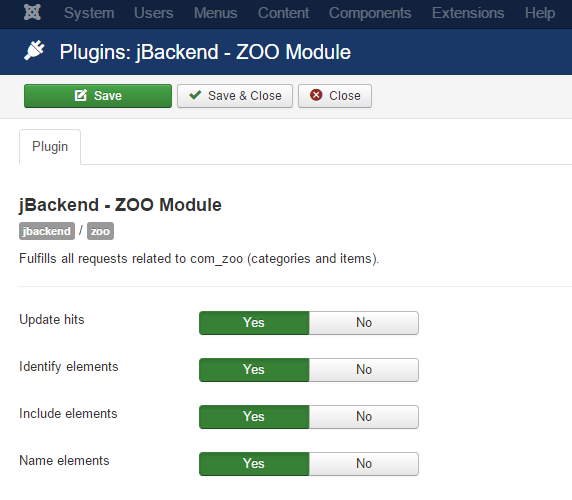The ZOO Module is implemented with the plg_jbackend_zoo plugin. It provides functions related to ZOO extension (applications, categories and items). Here is the list of supported methods.
Get the list of categories
Request parameters
action=get module=zoo resource=categories app=<app id>
Example
<end-point>?action=get&module=zoo&resource=categories&app=<A>
Example (REST format)
<end-point>/get/zoo/categories?app=<A>
Response
{
"status": "ok",
"total": <T>,
"categories": [
{
"id": "<category id>",
"name": "<category name>",
"alias": "<category alias>",
"description": "<description>",
"parent": "<parent id>"
},
...
{
"id": "<category id>",
"name": "<category name>",
"alias": "<category alias>",
"description": "<description>",
"parent": "<parent id>"
}
]}
Get a category
Request parameters
action=get module=zoo resource=categories id=<N> app=<app id>
Example
<end-point>?action=get&module=zoo&resource=categories&id=<N>&app=<A>
Example (REST format)
<end-point>/get/zoo/categories/<N>?app=<A>
Response
{
"status": "ok",
"id": "<category id>",
"name": "<category name>",
"alias": "<category alias>",
"description": "<category description>",
"application_id": "<application id>",
"parent": "<parent id>",
"ordering": "<ordering>",
"content_subtitle": "<content subtitle>",
"content_image": "<content image>",
"content_image_width": "<content image width>",
"content_image_height": "<content image height>",
"metadata_title": "<meta title>",
"metadata_description": "<meta description>",
"metadata_keywords": "<meta keywords>",
"metadata_robots": "<meta robots>",
"metadata_author": "<meta author>"
}
Get the list of items
Request parameters
action=get module=zoo resource=items category=<C> limit=<L> (optional) page=<P> (optional) app=<app id>
Example
<end-point>?action=get&module=zoo&resource=items&category=<C>&app=<A>
Example (REST format)
<end-point>/get/zoo/items?category=<C>&app=<A>
Response
{
"status": "ok",
"total": <T>,
"limit": <L>,
"page": <P>,
"items": [
{
"id": "<item id>",
"name": "<item name>",
"alias": "<item alias>",
"created": "<created date>",
"created_by": "<created by id>",
"modified": "<modified date>",
"modified_by": "<modified by id>",
"publish_up": "<publish up date>",
"publish_down": "<publish down date>"
},
...
{
"id": "<item id>",
"name": "<item name>",
"alias": "<item alias>",
"created": "<created date>",
"created_by": "<created by id>",
"modified": "<modified date>",
"modified_by": "<modified by id>",
"publish_up": "<publish up date>",
"publish_down": "<publish down date>"
}
]
}
Notes
Created and modified date format is YYYY-MM-DD HH:MM:SS
Get an item
Request parameters
action=get module=zoo resource=items id=<N> app=<app id>
Example
<end-point>?action=get&module=zoo&resource=items&id=<N>&app=<A>
Example (REST format)
<end-point>/get/zoo/items/<N>=?app=<A>
Response
{
"status": "ok",
"id": "<item id>",
"name": "<item name>",
"alias": "<item alias>",
"application_id": "<application id>",
"type": "<item type>",
"created": "<created date>",
"created_by": "<created by id>",
"modified": "<modified date>",
"modified_by": "<modified by id>",
"publish_up": "<publish up date>",
"publish_down": "<publish down date>",
"priority": "<item priority>",
"state": "<item state>",
"searchable": "<is searchable>",
"access": "<item access>",
"hits": <item hits>,
"metadata_title": "<meta title>",
"metadata_description": "<meta description>",
"metadata_keywords": "<meta keywords>",
"metadata_robots": "<meta robots>",
"metadata_author": "<meta author>",
"enable_comments": "<enable comments>",
"primary_category": "<primary category id>",
"elements": {
"<element 1 id>": {
"identifier": "<element 1 id>",
"type": "<element type>",
"data": {
"<field 1 name>": "<field 1 value>",
...
"<field M name>": "<field M value>"
}
},
...
"<element N id>": {
"identifier": "<element N id>",
"type": "<element type>",
"data": {
"<field 1 name>": "<field 1 value>",
...
"<field L name>": "<field L value>"
}
},
}
}
Notes
Created and modified date format is YYYY-MM-DD HH:MM:SS
When option Identify elements is set to No, the elements structure is different:
"elements": [
{
"identifier": "<element 1 id>",
"type": "image",
"data": {
"<field 1 name>": "<field 1 value>",
...
"<field M name>": "<field M value>"
}
},
{
"identifier": "<element N id>",
"type": "textarea",
"data": {
"<field 1 name>": "<field 1 value>",
...
"<field L name>": "<field L value>"
}
}
]
Plugin Settings
The following options are available for user plugin:
| Option | Description |
| Update hits | Update hits counter for each request. |
| Identify elements | Use field identifier as key to build the elements in the response. |
| Include elements | Include elements data in the list of items. |
| Name elements | Use a slug name for elements (in lowercase without blanks). |

